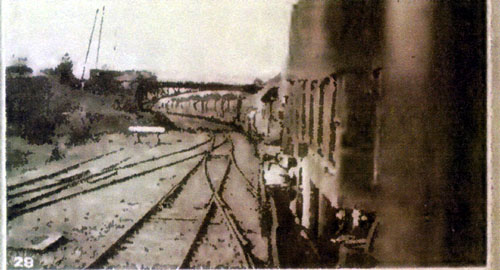
View out a door of the railway train carrying the 148th to the
Thateau-Thierry Front, July, 1918.
The men were carried to the front in the infamous "wagons de 40 hommes et 8 chevaux en long" which
the French provided for transport of men and horses. The voitures were narrow guage small box cars which were formerly
used to carry horses. The cars were pungent with the aroma of merde de cheval
The "40 et 80's" were so-called from the stencils on the doors loosely translated as
"It'll hold 40 Tommies or 8 she oxes." The Yanks sometimes referred to the
cars as "sidedoor Pullmans" or as "Bucko Specials."
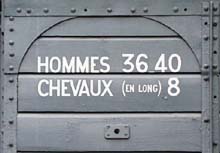
Stencil on door of French box car.
The stencil indicated that the capacity of the railway car was forty men or 8 horses. When forty men were crammed into the
little French car, there was no room to lie down. Charles Hoyt, Heros of Argonne, described sleeping in one of the cars,
"By interlacing anatomy, forty men were accommodated in each car.
It was not comfortable riding. Men were stacked in and piled up in a manner that would have
brought protests from a self-respecting sheep on the way to market.
At night they criss-crossed each other, cursed, and possessed of a soldier's privilege, slept even under those conditions."
"Pvt. Stewart M. Emery, 29th MP. Company, composed a piece of nostalia devoted to the little cars:
HOMMES, 40—CHEVEAUX, 8
Roll, roll, roll, over the rails of France
See the world and its map unfurled, five centimes in
your pants.
What a noble trip, jolt, jog and jar,
Forty we, with equipment C, in one flat wheel box car.
We are packed by hand,
Shoved aboard in teens,
Pour a little oil on us
And we would be sardines.
Rations! Oo-la-la! and how we love the man
Who learned how to intern our chow in a cold and
clammy can.
Beans and beef and beans, beef and beans and beef,
Willie raw, he will win the war,
take in your belt a reef.
Mess kits flown the coop,
Cups gone up the spout.
Use your thumbs for issue forks
And pass the bull about.
Hit the floor for bunks, six hommes to one homme's
place.
It's no fair to the bottom layer, to kick 'em in the face.
Move the corp'ral's feet out of my left ear,
Lay off, Sarge, you are much too large—
I'm not a bedsack, dear.
Lift my head up, please,
From this bag of bread;
Put it on somebody's chest,
Then I'll sleep like the dead.
Roll, roll, roll, roll, hammer and snore and fight,
Traveling Zoo the whole day through,
and bedlam all the night.
Four days in the cage, going from hither to hence.
Ain't it great to ride by freight at good old Unc's
expense?
Writer's notes: "Willie raw," corned willy, i.e. tinned corned beef somewhat similar to
"monkey meat," tinned corned beef with carrots; "bull," bully beef, i.e. tinned corned beef sometimes served with a bisquit upon which one
might break one's teeth. The little French box cars provided the inspiration for the
American veterans' organization, the "40 and 8,"
The 148th was a part of the 66th Field Atillery Brigade. The entire Brigade had over
500 gasoline vehciles including 60 Holt Tractors, 299 Ammunition and Supply Trucks, 150 motorcycles, 4 Packard tanker trucks as well as guns, trailers, rolling kitchens,
water carts, etc.
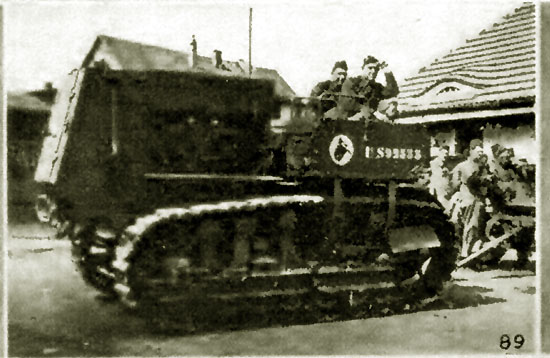
Holt Tractor assigned to 148th.
The Holt Tractor bult by a predecessor of today's Caterpillar Tractor Company provided the inspiration for the
British invention of the tank. Note the Bucking Horse and Rider insignia used on equipment of the
148th.
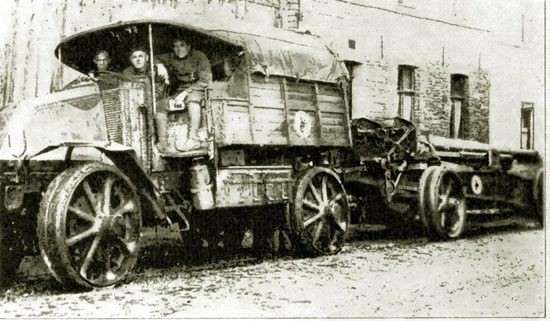
Truck assigned to 148th, 1918. Note Bucking Horse and Rider insignia.
On July 7, 1918 the first shots were fired by the brigade. On July 14, the 148th participated in the opening of the
Champagne-Marne Defensive battle. On the the defensive battle of the Alsne-Marne defensive was opened. On August 11,
the brigade was transferred to St. Mihiel. and the Sept. 26 the brigade participated in the opening of
the Seuse-Argonne offensive. The brigade's last shot was fired on November 11.
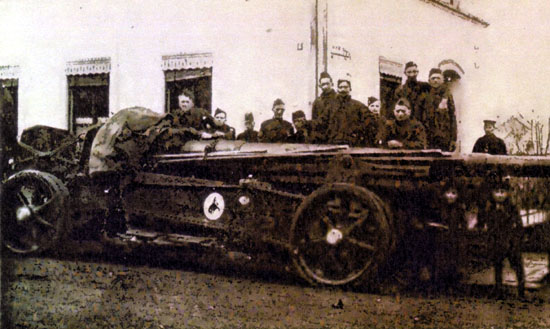
Canon de 155 Grande Puissance Filloux, 1918. Note Bucking Horse and Rider insignia.
The Brigade was under continuous fire for some four months. The unit's kitchens were generally fairly close to the line. In such case,
food was often slumgullion stew brought up to positions in large buckets. when under fire,
the men ate corned willy which could be heated with a canned fuel similar to modern-day Sterno.
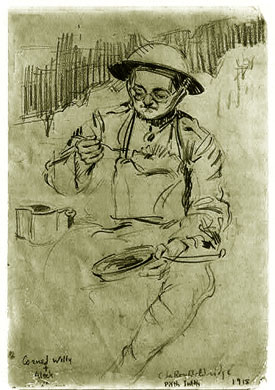 Left, Alexander Wolcott, 5th Infantry, eating
canned willy, Argonne, 1918. Drawing by Ron Baldridge, Below, "Cooties," drawing from Davis and Clay, "Battery C, 148th Field Artillery.
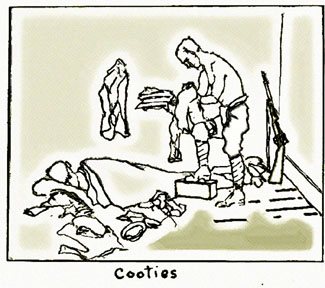
We all know what he is. Those who don't, have lacked the greatest joy a soldier can have. Did we say joy? We beg your pardon--we mean misery. Yes, real misery, with the sting left in.
They are a perfectly harmless pest when left to their own pursuits, but when they once find you to be suitable hunting
ground they stick to you like the paper to the wall. They are quite content to rest peaceful during the day but at night
they find no greater pleasure than in frolicking about your anatomy, holding sweepstake races around your neck. Whey they persist in holding their carnivals at night we have never been able to find out.
But we do know if it were not for the cooties and gas alarms a soldier could rest and sleep quite
comfortably when his tired body seeks it have.
We have in our battery a hard boiled corporal who saw service on the Mexican Border, that delights in giving these harmless pests a home for life.
If cooties were to us as they are to him they would be one of the least of our worries.
It is a very good idea to keep your six shooter loaded for at midnight, when you are awakened by their love squirms, you are apt to find one or
two large enoght to demand a man's size bullet, and it is a duty to your country to
extinquish the life of the foe which recognizes neither the righteousness of our cause nor the folly of our enemies.
They squirm, crawl, wiggle and scratch on all and every part of your
anatomy, and how a fellow gets accustomed to them, well, after providing them with
perfectly good homes for the past six months, we are about to find out.
A soldier is known by the cooties he keeps.
How many little cooties have you?
Davis and Clay, pp. 90-91
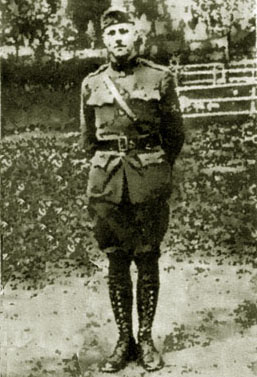 Captain Willian A. Sawtell after promotion to major and
transfer to 3rd Battalion staff. Captain Willian A. Sawtell after promotion to major and
transfer to 3rd Battalion staff.
Of course, there were lighter moments. The writer's father-in-law recalled when he and several other members of his unit
stopped at a French farm house near Argonne, They were offered coffee. The lady of the house asked the men if they would like milk in
their coffee. When they responded affirmatively, the family goat was summoned which lept up on the table to be milked into the
coffee cups. On another occasion, one of the soldiers was holding a baby. He thought from something he whiffed that
the baby had spoilt its nappies and the
baby was gingerly handed back to its mother. It was the cheese
the boys were being offered. Those were the only two instances of his service in France that he
ever talked of.
Following the Armistice, the various battaries of the 148th Field Artillery were assigned to occupation duty in
Germany. On May 11, 1919 orders were received for the Brigade to return to the United States. Most of the Brigade raced back to New York on the
Peerless and the Floridan. The Peerless left St. Nazaire first, twelve hours ahead of the Floridan. When the Floridan passed in the middle of the
Atlantic three days out from New York everyone thought the Floridan would get into New York first.
But the captain of the Peerless was determined to prove everyone wrong and put the pedal to the metal. Neverthess, he lost the race anyway
but by only a couple of hours.
On board was the regimental band, called in France "The Million Dollar Band," since the French believed that everyone
was a millionaire. See New York Evening World June 14, 1919, final edition.
Senator Kendrick hurried to
New York to greet the troops from Wyoming. Most of the units from Wyoming arrived on schedule.
Battery F, the old Company "C," was not among those arriving. It was delayed by a quarantine in France and finally arrived about a week later in
New Port News. The other units when they arrived in Cheyenne were given a big welcome, a parade, and a dance in the
City Park. It was repeated a week later for
Battery F.
Two men from the Big Horn Basin died in the campaigns, Lafayette Blackburn from Penrose and everett Maxwell from Cowley. Some of the men were tranferred to other units.
Of the twenty-one officers shown on the roster for Battery F at the end of the war, only four were shown as coming from Wyoming. Of those four only one Rebert E.
Lee of Thermopolis was from the Basin. At the end of the War, Major Sawtell moved to Miles City. Later, he became a bank president in Omaha. For roster of
Battery F, old Company C, in pdf format, click here.
Information as to Battery F is generally based on newspaper accounts in the Powell Tribune: Davis, Paul M. and Hubert K. Clay:
History of Battery "C", 148th Field Artillery, American Expeditionary Forces; and Sawtell, W. A, Frank R. Jeffrey, W. S. Griscom, Wm. R. Wright:
A History of the Sixty-Sixth Field Artillery Brigade, American Expeditionary Forces. The Davis and Clay accounts are written more from the perspective
of enlisted men. Major Sawtell's account is more a straight history of the 146th and 148th Field Artillery during the war complete with rosters, citations, casualties,
equipment, and
battery statistics such as number of shots fired, etc.
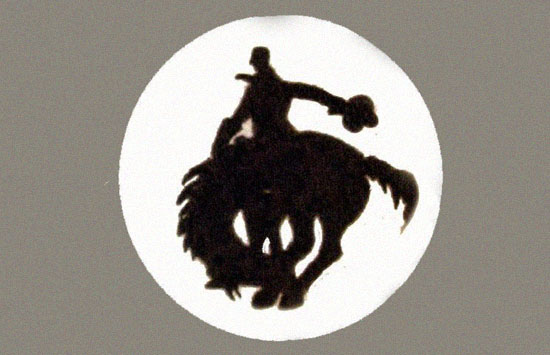
148th Field Artillery insignia.
Music this page courtesy Horse Creek Cowboy:
MADEMOISELLE FROM ARMENTIERES
Mademoiselle from Armentieres, Parley-voo?
Mademoiselle from Armentieres, Parley-voo?
Mademoiselle from Armentieres,
She hasn't been kissed in forty years,
Hinky, dinky, parley-voo.
Mademoiselle from Armentieres, Parley-voo?
Mademoiselle from Armentieres, Parley-voo?
She had the form like the back of a hack,
When she cried the tears ran down her back,
Hinky, dinky, parley-voo.
Mademoiselle from Armentieres, Parley-voo?
She never could hold the love of man
'Cause she took her baths in a talcum can,
Hinky, dinky, parley-voo.
Mademoiselle from Armentieres, Parley-voo?
She had four chins, her knees would knock,
And her face would stop a cuckoo clock,
Hinky, dinky, parley-voo.
Mademoiselle from Armentieres, Parley-voo?
Mademoiselle from Armentieres, Parley-voo?
She could beg a franc, a drink, a meal,
But it wasn't because of sex appeal,
Hinky, dinky, parley-voo.
Mademoiselle from Armentieres, Parley-voo?
Mademoiselle from Armentieres, Parley-voo?
She could guzzle a barrel of sour wine,
And eat a hog without peeling the rind,
Hinky, dinky, parley-voo.
The MPS think they won the war, Parley-voo.
The MPS think they won the war, Parley-voo.
The MPS think they won the war,
Standing guard at the café door,
Hinky, dinky, parley-voo.
The officers get the pie and cake, Parley-voo.
The officers get the pie and cake, Parley-voo.
The officers get the pie and cake,
And all we get is the bellyache,
Hinky, dinky, parley-voo.
The sergeant ought to take a bath, Parley-voo.
The sergeant ought to take a bath, Parley-voo.
If he changes his underwear
The frogs will give him the Croix-de-Guerre,
Hinky-dinky, parley-voo.
You might forget the gas and shells, Parley-voo.
You might forget the gas and shells, Parley-voo.
You might forget the groans and yells
But you'll never forget the mademoiselles,
Hinky, dinky, parley-voo.
Mademoiselle from Armentieres, Parley-voo?
Mademoiselle from Armentieres, Parley-voo?
Just blow your nose, and dry your tears,
We'll all be back in a few short years,
Hinky, dinky, parley-voo.
Next page: Powell continued, Earl Durand the Tarzan of the Tetons.
|